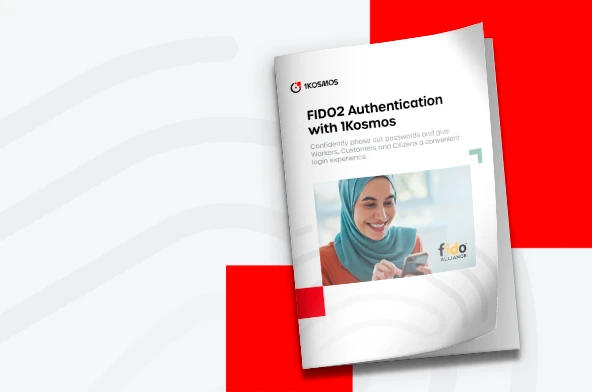FIDO2 Authentication with 1Kosmos


Confidently phase out passwords and give Workers, Customers and Citizens a convenient login experience.
FIDO (Fast Identity Online) authentication is a powerful technology that brings significant benefits to organizations by providing a convenient way to access company resources for the workforce, and a more secure and convenient way to access online services for customers and citizens.
In today’s digital age, ensuring the security of user authentication has become increasingly important for organizations. With the ever-growing threat landscape, organizations must adopt advanced authentication solutions to protect their sensitive information and assets. The FIDO Alliance has been working towards a passwordless future, where strong authentication is delivered with a user-friendly experience. This paper will
provide an overview of how 1Kosmos delivers FIDO2 authentication for stronger user authentication.
FIDO2 is the latest authentication standard introduced by the FIDO Alliance, which offers strong and simple authentication. FIDO2 authentication eliminates the need for passwords, making it more secure and user-friendly. The FIDO2 authentication process involves a user device, such as a smartphone or a security key, and a server that confirms the user’s identity. The FIDO2 authentication process uses public-key cryptography, which means the protocol eliminates the need for passwords and offers a strong and secure authentication mechanism.

Traditional password-based authentication systems are vulnerable to a variety of security threats, such as phishing, social engineering and brute-force attacks. These threats can lead to security breaches and the loss of sensitive data. With FIDO2 authentication, employees can be empowered to use their personal devices, such as smartphones or corporate-issued security keys, or supporting desktop systems to authenticate into corporate systems and applications. This eliminates the need for traditional passwords and reduces the risk of security breaches caused by password-related attacks.
FIDO2 can provide a more secure and convenient way to access online services. With FIDO2, customers can use their personal devices, such as smartphones or supporting workstations, to authenticate into online services without the need for traditional passwords. This eliminates the risk of password-related security breaches like ATO attacks and can make it easier for customers to access and manage their accounts.
Recent collaborations between industry giants such as Apple, Microsoft, and Google, alongside the FIDO Alliance and the World Wide Web Consortium, have solidified the support for passkeys as an authentication method.
This innovative approach to authentication relies on cryptographic keys and leverages cloud storage to securely store credentials for multiple devices. By combining a passkey on their smartphone with encrypted and safely stored cloud-based credentials, users can enjoy a streamlined and secure account authentication process.
The advent of passkeys brings forth a new era, eliminating the need for traditional passwords and paving the way for enhanced security and efficiency. Integrated seamlessly with existing applications, passkeys have the potential to significantly reduce the risks associated with identity theft and phishing attempts.
There is a catch with passkeys, however. For organizations seeking an extra layer of security, device-bound passkeys present a compelling option. In the current iteration, user authentication would be stored within the Microsoft, Google and Apple ecosystems. This means users could authenticate from anywhere with unmanaged devices and auditing would be difficult if not impossible. Not to mention an ability to share passkeys, should frighten security teams enough to look for another option.
For customers and citizens, the promise of convenience, user experience, and security – passkeys are exactly what the industry has been driving toward.
1Kosmos has been a member of the FIDO Alliance and is committed to supporting a passwordless future. 1Kosmos offers a FIDO2 certified BlockID platform that provides strong identity verification and authentication capabilities. The 1Kosmos BlockID platform offers a combination of government-certified biometric and document verification, which adds an immutable identity layer on top of FIDO2 authentication. This makes credential sharing and identity impersonation impossible, enhancing the security of the authentication process.
The 1Kosmos implementation of the FIDO standard emphasizes interoperability. This approach guarantees that FIDO security keys from various vendors and hardware equipment from various suppliers will work together efficiently. Further, this interoperability will be achieved with cross-browser support for passwordless authentication.
1Kosmos facilitates seamless interoperability not only among connected web applications but also across workstations by linking the FIDO token to the user account. Our support for FIDO-based authentication also includes Windows and Mac workstations. Users can leverage the BlockID mobile app, which serves as a FIDO authenticator, to log into their workstations.
Enrollment
During the enrollment process, the user registers their FIDO key on the 1Kosmos control plane (the platform). The FIDO key generates a unique public-private key pair. The public key is registered on the platform, while the private key remains securely stored on the FIDO key.
Authentication
When the user attempts to log in to the service, the FIDO key plays a vital role in the authentication process. Here’s a step-by-step breakdown:
1Kosmos has been supporting a passwordless future through its FIDO2 certified BlockID platform. The platform provides strong identity verification and authentication capabilities, making it more secure and user-friendly. The user journey of 1Kosmos with FIDO2 authentication is simple and user-friendly, eliminating the need for passwords. The platform provides strong security measures, such as government-certified biometric and document verification, public-key cryptography, and conditional access mechanisms. Organizations can leverage 1Kosmos BlockID platform to strengthen their authentication mechanisms and protect their sensitive information and assets.